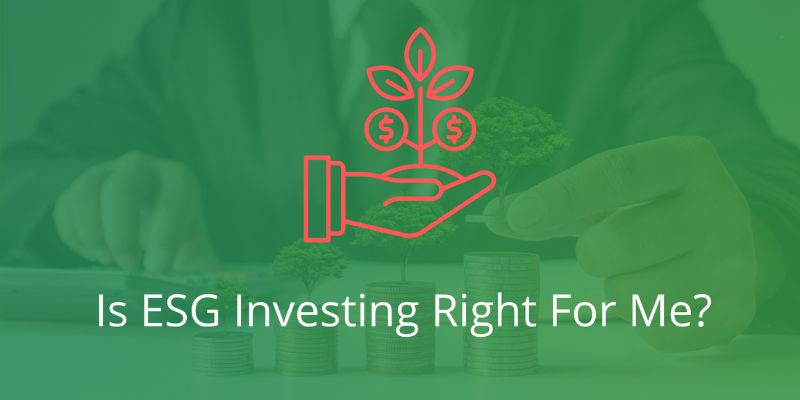Is ESG Investing Right for Me? Uncover the Pros and Cons for Savvy Investors
You’ve heard the buzz about ESG investing, but is it right for you? Let’s dig in. Imagine a world where your investments align with your values. That’s the heart of ESG—where your money speaks for the environment, social justice, and strong leadership within the companies you back. But it’s not all green pastures and easy gains. Like any choice, ESG investing comes with its ups and downs. As we peel back the layers, you’ll discover if this approach can truly bolster your portfolio while staying true to what you believe in. Get ready to explore the ins and outs and see how this strategy fits into your financial puzzle.
Understanding ESG Investing and Its Core Principles
What ESG Investment Means for the Individual Investor
As an expert in mixing good values with smart investing, I see ESG as a star player. Think of ESG investing like picking a meal. You want something tasty but also good for your health, right? Well, in the world of money, ESG investing is choosing stocks or funds that are not only about making more cash but also doing good for the planet and people. It’s using your dollars to vote for a cleaner and fairer world, while also aiming for solid returns. Now that sounds like a win-win to me!
The Three Pillars: Environmental, Social, Governance Factors
The heart of ESG investing beats strongly with three main parts: environmental, social, and governance factors. Imagine a stool with three legs, each one crucial for balance.
First up, environmental. This means we care about how a company treats our planet. Do they recycle? Use clean energy? Keep their carbon footprint small? These things matter, and they can actually lead to less risk and potentially more profit in your investments.
Next is the social aspect. Here’s where we look at how companies deal with people. Are they good to their workers? Do they make products that are safe and fair? Companies that score high in social good can be strong players because happy workers and customers often mean a thriving business.
Last, we’ve got governance. This one’s all about the rulebook of a company. Do they play fair and square? Are the big bosses honest? Companies that are open and have strong rules often stay out of trouble, which is great news for investors like you looking for less drama in your portfolio.
To sum things up, by choosing to invest in ESG, you’re not just looking to fill your wallet. You’re on a mission to back businesses that care for Earth’s health, treat people right, and follow the rules. If putting your money where your heart is sounds like your jam, then ESG investing could very well be your groove.

Evaluating the Benefits and Challenges of ESG Investing
The Positive Impact of ESG Criteria on Investment Strategy
Have you thought about what ESG means for your money? It stands for environmental, social, and governance, and it’s a way to make your investment do some good in the world while still aiming to make a profit. ESG investing is like inviting your values to the table when deciding where to put your cash. It’s more than just picking stocks; it’s about picking the future you want to see.
Let’s dig into the good stuff—ESG can bring new wins to your investment game. Good ESG ratings can signal a company cares about more than just profits. They look after the planet, treat people well, and run a tight ship. That’s important, right? People are noticing this, and money is flowing in. This means many ESG funds are performing well. What’s more, these funds can diversify your portfolio. That’s a fancy way of saying they spread out the risk. They mix things up with different types of investments. So, if one goes wonky, you’re not left with empty pockets.
When you choose ESG, you’re joining a club of savvy investors. These folks don’t just throw money around. They think long-term. They’re often in it for the long haul, and that patience can pay off. Choosing companies that are doing good for the world can be good for your wallet too. And let’s be real, who doesn’t want money and morals to line up?
Weighing ESG Investment Benefits Against Potential Limitations
But hold on—let’s keep it 100. We need to look at both sides of the ESG coin. While we celebrate the wins of ESG investing, we’ve got to talk about the challenges too. Some say ESG investing is just a trend. But it’s more than that—it’s here to stay.
However, it might be tough to find ESG gold. Not every company with a shiny ESG sticker is the real deal. You’ve got to look under the hood. Companies can make themselves look better than they are—it’s called greenwashing. Sneaky, right? So finding the true stars in the ESG world might take some extra homework.
And let’s chat about the cash. Sometimes ESG investments ask for a bit more money upfront. Those extra dollars go towards making sure everything checks out with your values.
Also, the numbers. They might not always jump as high or as quick as traditional ones. That’s okay, though. Remember, many ESG investors are playing the game with an eye on tomorrow, not just today.
So, is ESG investing right for you? If you care about where your money snoozes at night and dream of returns that don’t cost the earth its future, then ESG might just be your investment soulmate. It’s got its ups and downs, but what doesn’t? The key takeaway: ESG is about investing in progress while paving the way for potential profit. Your values and your value can go hand in hand.

Strategies for Integrating ESG into Your Investment Portfolio
Diversification through ESG Funds and ETFs
You’ve likely heard diversification is key for a strong investment portfolio. So, what are ESG funds and ETFs? They are pools of varied ESG-friendly assets. Think of them as baskets of investments that meet strict, good-doing criteria. They cover environmental care, fair social practices, and solid company governance. Adding these to your portfolio spreads out risk. It’s like not putting all your eggs in one basket – a wise move for safety and growth.
You start with deciding your mix. If the planet’s health matters to you, favor funds focused on green investing. Is it social issues you care about most? There are funds for that, too. Then, look out for ethical funds or ESG ETFs that match those causes. They bring together many assets that you align with, making investment choices simpler. Plus, they’re ready-made for easy buying.
A practical way to start might be using sustainable investment funds. These funds aim for long-term gains. They do so while holding strong in their ESG commitments. And don’t worry, you’re not trading values for value. Many ESG funds perform just as well – in some cases, even better – than traditional ones. This is a point to remember when someone asks about ESG vs traditional investing. With these, you’re building a future-focused portfolio, factoring in both financial return and moral standings.
Employing ESG Ratings and Screening for Stock Selection
Stock picking can be tricky, right? That’s why we have ESG ratings. An ESG rating helps you judge a company’s behavior in detail. For example, how does a company treat its workers or the environment? These ratings grade them, giving you valuable insight to invest with care. With good ESG scores, you’re looking out for companies that score high on doing the right thing.
Screening stocks is your personal filter. It’s your way of saying no to what doesn’t fit your vibe. Let’s say a small carbon footprint is a big deal to you. Use carbon footprint analysis to find companies that are light on the planet. Or maybe you want to promote company honesty and ethics. You’d then screen stocks for top governance factors.
For the hands-on investor, ethical stock picking is a path to consider. This means you pick each stock yourself using ESG criteria in investing. It takes more work, sure. But it gives control. You choose exactly where your money goes. You’re an active part in backing what improves our world.
Starting with these strategies – diversifying with funds and ETFs, rating and screening stocks – puts you on the track to responsible investment. Each step lets you mix your money moves with your values. It lets you join the wave of socially conscious investment products. Investing this way doesn’t just aim for your wealth to grow. It also hopes to make the world a bit better. That’s smart, and it’s something to feel good about.
Remember, while the perks are plenty, take each step with thought. Responsible investing isn’t just a trend. It’s a powerful way to voice what matters to you, through your investing dollars.

Analyzing ESG Investing Performance and Risk Management
Comparing ESG Funds Performance with Traditional Investments
You wonder if ESG funds keep up with other investments, right? The short answer: yes, many do. Now, let’s dig deeper. ESG investing often matches or even beats old-style investing. This is a game-changer. Why? Because you don’t have to give up gains for your values. Sustainable investments have grown fast. This is because they tackle real-world issues. Think about it. Companies with strong ESG scores often care about the long run. And they work to cut risks linked to things like climate change and unfair labor.
But here’s the deal. Not all ESG funds perform the same. That’s why checks on ESG ratings matter so much. They help you see how deep a fund’s ESG game is. Smart, right? Plus, ESG funds can shine when markets dip. They tend to sway less because they invest in firms focused on tomorrow. This can mean fewer shocks for your money.
ESG Risk Management: How to Approach ESG Investing Prudently
Let’s talk risk, a big deal in any investing chat. So, how to play it cool with ESG risk management? First off, know what you’re getting into. Learn how ESG factors tweak a company’s risk. Social issues, for instance, can hurt a brand real bad if not handled right. Next, look at ESG investment strategies as more than just a trend. You want to stick to the plan for the long term. That’s where you often see ESG’s true colors shine.
Here are some solid moves: Mix up your picks with ethical funds and renewable energy bets. This is what they call investment portfolio diversification. It shields you from bumps. And keep your eyes on ESG and financial return. They must go hand in hand for your wins. Don’t skip on digging into ESG reporting too. It clues you in on how companies stick to their ESG vows.
Let’s circle back to ESG risk. It pays off to consider the ESG track record of a fund. How’s it done in storms before? That tells you a lot about how it might roll in future twists and turns. Look, green investing isn’t just a feel-good choice. It’s about putting your dough where your heart is, without giving up on profits.
So, to wrap up, aligning values with investment can be smart dough-wise. It’s not just a big thumb up for the planet and its people. It’s about being shrewd with risks and keeping your eyes fixed on the prize: a mix of solid returns and doing good. Isn’t that something we’re all after?
In this post, we dug into ESG investing and what it means for you. We looked at the main parts: the environment, social issues, and how companies are run. We talked about how ESG can shape your investing and the good it can do. But we also looked at the hard parts, like weighing the pros against the cons.
Next, we went over how to mix ESG into your money plan. We explored different ESG funds and how to pick stocks that fit ESG ideas. And we didn’t stop there. We checked out how ESG investments stack up against regular ones and the smart ways to handle ESG risks.
To wrap up, ESG investing is powerful. It lets you put money into what you care about and can still help you reach your money goals. Think about how these ideas can fit into your own investing way. There’s no one-size-fits-all, but with the right info, you can make choices that feel right and do right.
Q&A :
What is ESG Investing and How Does it Work?
ESG investing considers environmental, social, and governance factors alongside financial factors in the investment decision-making process. It involves assessing the sustainability and ethical impact of an investment in a company or business. By incorporating ESG criteria, investors aim to support businesses that contribute positively to society or the environment, while potentially reducing investment risk and generating long-term financial returns.
How Can I Determine if ESG Investing Aligns With My Personal Values?
To determine if ESG investing is right for you, start by identifying your personal values and understanding what ESG issues are most important to you. Review the ESG policies and practices of potential investment options to see if they align with your values. Consider working with financial advisors who specialize in ESG investing or using online platforms that provide ESG ratings and analysis.
What Are the Potential Benefits of ESG Investing?
The potential benefits of ESG investing include the possibility of achieving competitive financial returns while also promoting social good. ESG investments may have lower risk profiles, as companies with strong ESG practices might be better managed and more forward-thinking. Additionally, investing in ESG can support innovation and progress in areas such as environmental sustainability and social responsibility.
Are There Any Risks Involved with ESG Investing?
Like all investments, ESG investing carries risks. One risk is that ESG metrics are not standardized, leading to a lack of consistency in reporting and assessment. There may also be a risk of overpaying for popular ESG stocks if demand outstrips supply. However, proper due diligence and diversification can help mitigate these risks.
How Do I Start ESG Investing?
To start ESG investing, research to identify funds or companies that match your ESG criteria. Consider low-cost ESG index funds or ETFs if you’re looking for a diversified approach. Alternatively, you can select individual companies with high ESG scores. Consult a financial advisor with experience in ESG investing to help develop an investment strategy that suits your financial goals and ethical preferences.

